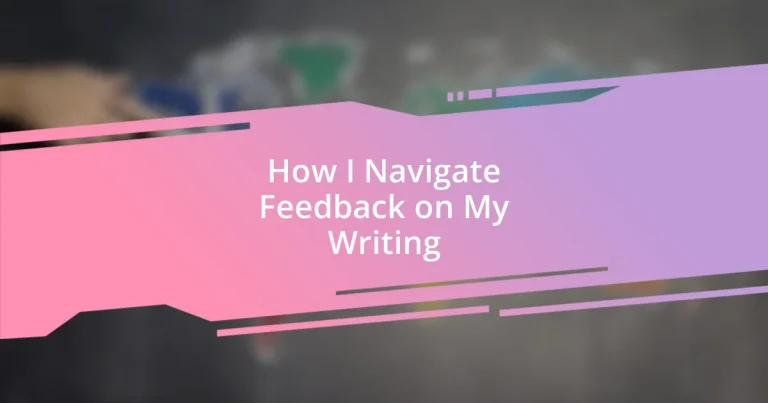Key takeaways:
- Feedback enhances writing by revealing blind spots and encouraging growth, challenging writers to evolve their narratives and skills.
- Establishing a diverse feedback network fosters supportive relationships, allowing for varied perspectives and constructive criticism that enhances the writing process.
- Reflecting on and implementing feedback effectively transforms initial emotional reactions into opportunities for improvement, deepening both the work and the writer’s understanding of their craft.
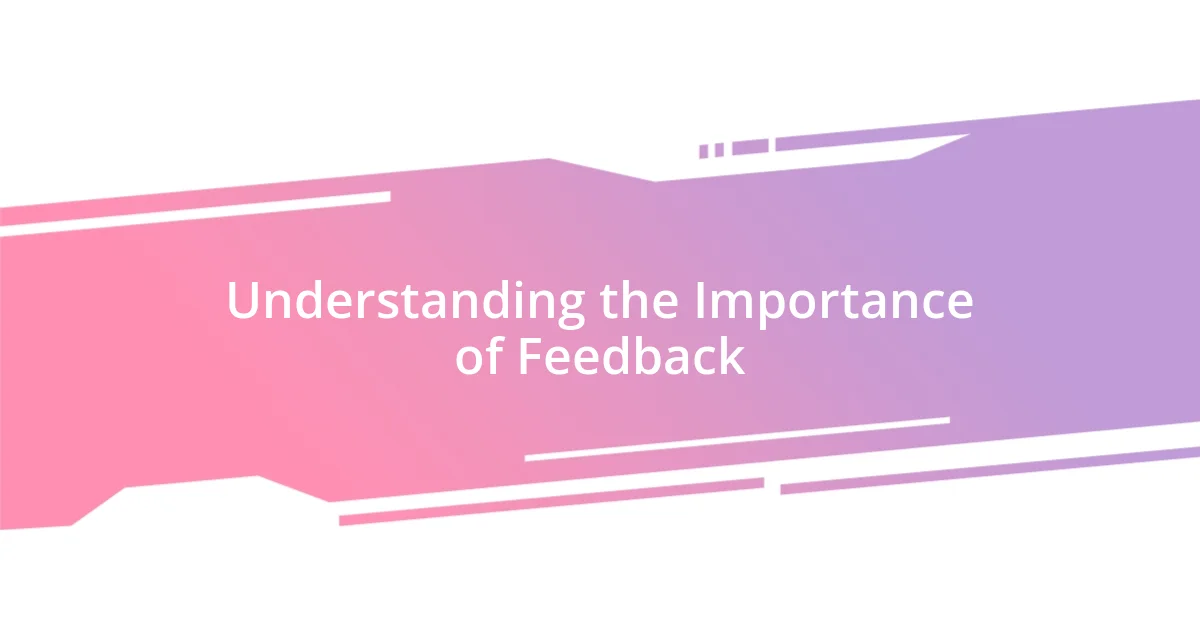
Understanding the Importance of Feedback
Feedback is a powerful tool in the writer’s journey. I remember a time when I was deeply attached to a story I had written. I thought it was flawless until a friend pointed out some structural weaknesses. Initially, I felt defensive. But that feedback turned out to be a game changer, guiding me to refine my work.
It’s fascinating how feedback can illuminate blind spots in our writing. When I received critiques during a writing workshop, I realized that different perspectives can reveal layers of meaning I hadn’t considered. Have you ever noticed how a fresh pair of eyes can uncover subtleties you’ve overlooked? Embracing that insight can elevate your writing to new heights.
Moreover, feedback fosters growth by challenging our ideas. I often find myself wrestling with input I didn’t agree with at first, only to discover that it deepened my understanding of the subject. This push and pull is where real development happens. Isn’t it intriguing how our comfort zones can expand when we embrace constructive criticism? It’s a vital reminder that writing, like any craft, thrives on evolution.
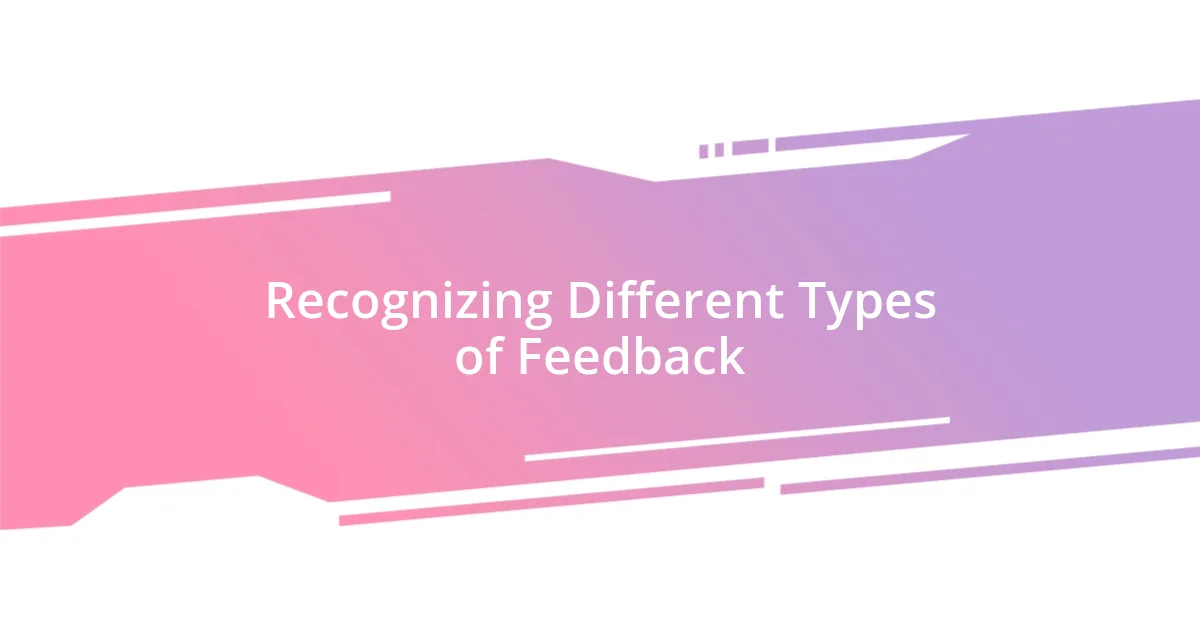
Recognizing Different Types of Feedback
Recognizing different types of feedback is crucial for any writer. Personally, I’ve encountered various forms of feedback throughout my writing journey. For instance, some readers provide emotional responses, expressing how my words made them feel, while others focus on technical aspects, like grammar and structure. Understanding this distinction helps me navigate feedback more effectively and tailor my revisions.
I often categorize feedback into three types: personal, constructive, and surface-level. The first category reveals emotional reactions, which can inspire me or challenge my approach. The second group, constructive feedback, delves into specifics that enhance my writing, such as plot holes or character development. Surface-level feedback, while useful, tends to point out minor issues rather than tackling deeper concerns. Recognizing these types can significantly impact my editing process.
Knowing the nature of the feedback I receive shapes my responses to it. For example, when a colleague critiques my story’s pacing, it can initially sting. However, I remind myself that this is a chance to view my work through another lens. Embracing all types can deepen my understanding and ultimately lead to a more polished final draft.
| Type of Feedback | Description |
|---|---|
| Personal | Emotional reactions and feelings from readers |
| Constructive | Specific suggestions for improvement, like plot or character work |
| Surface-Level | Minor errors or superficial comments not focusing on overall depth |

Establishing a Feedback Network
Establishing a feedback network is essential for nurturing my growth as a writer. Over the years, I recognized the power of surrounding myself with diverse voices. When I first sought feedback, I connected with fellow writers through online forums and local workshops. The variety of perspectives was invaluable. I recall one memorable session where a fellow writer shared insights that shifted my entire approach to character development. That moment reinforced my belief that a robust feedback network can expose me to new ideas I might never have encountered alone.
Building an effective feedback network involves reaching out and being open to different opinions. Here’s what I focus on to create a supportive group:
- Diversity: I actively seek out readers from different backgrounds and writing styles to gain varied viewpoints.
- Trust: Establishing a relationship where honest and constructive criticism can flourish is crucial; I want my peers to feel comfortable sharing their thoughts.
- Consistency: Regular feedback sessions help maintain momentum; I schedule monthly meet-ups to discuss each other’s works.
- Shared Goals: Aligning with those who have similar aspirations fosters a sense of camaraderie; we motivate each other to push boundaries.
- Supportive Environment: Creating a non-judgmental space encourages brave sharing, and I value the encouragement just as much as the critique.
Each of these elements has helped me cultivate a feedback network that empowers my writing journey.
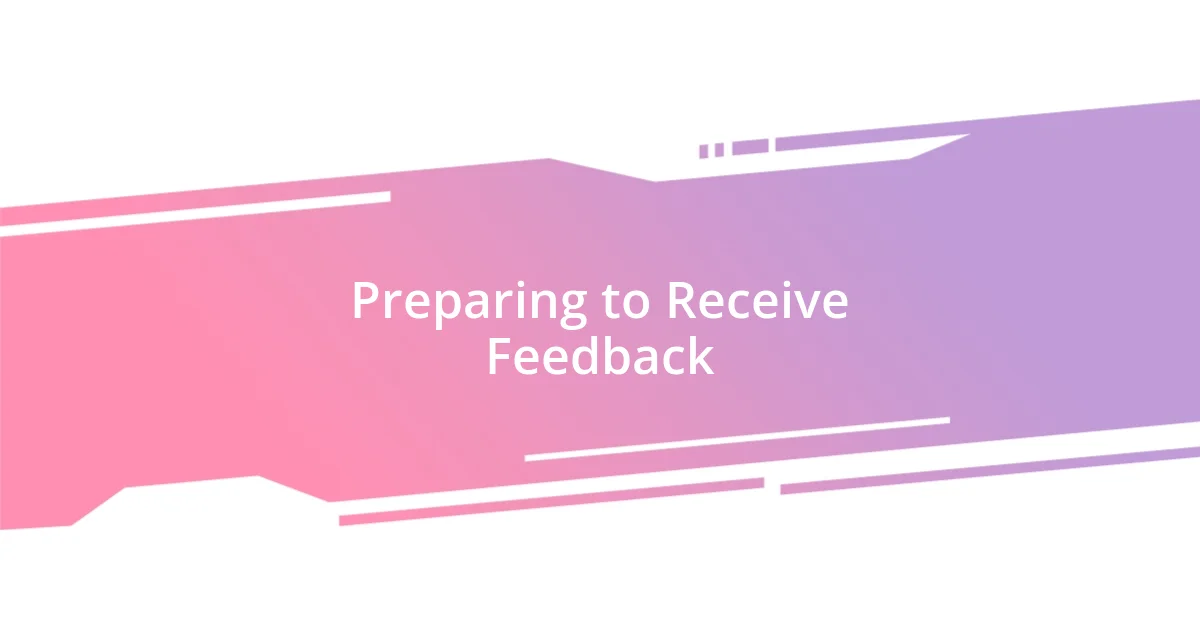
Preparing to Receive Feedback
Preparing to receive feedback can feel like standing on the edge of a diving board—exciting yet nerve-wracking. Before each round of feedback, I remind myself to approach it with an open heart and a curious mind. This helps me turn any initial anxiety into anticipation. Have you ever experienced that moment where a critique felt more like a personal attack than a constructive suggestion? I’ve been there, and it took practice for me to shift my mindset.
I like to create a calm space for myself before I dive into feedback sessions. I often brew a cup of my favorite tea, allowing the warmth to settle my nerves. On one occasion, after receiving some tough feedback on a short story, I took a long walk to process it. The fresh air did wonders, and it gave me clarity on how I could apply the critiques to improve my work. I found that preparing emotionally can transform my experience entirely—turning potential hurt into opportunity.
Another critical aspect is setting specific goals for what I want to achieve with the feedback. I typically jot down areas I hope others will focus on, like character development or pacing. By doing this, I create a roadmap that helps me navigate through the sea of opinions. Have you ever felt overwhelmed by feedback that seemed to contradict itself? That’s why having well-defined expectations has become my secret weapon, making it easier to sift through the details and hone in on what truly matters.
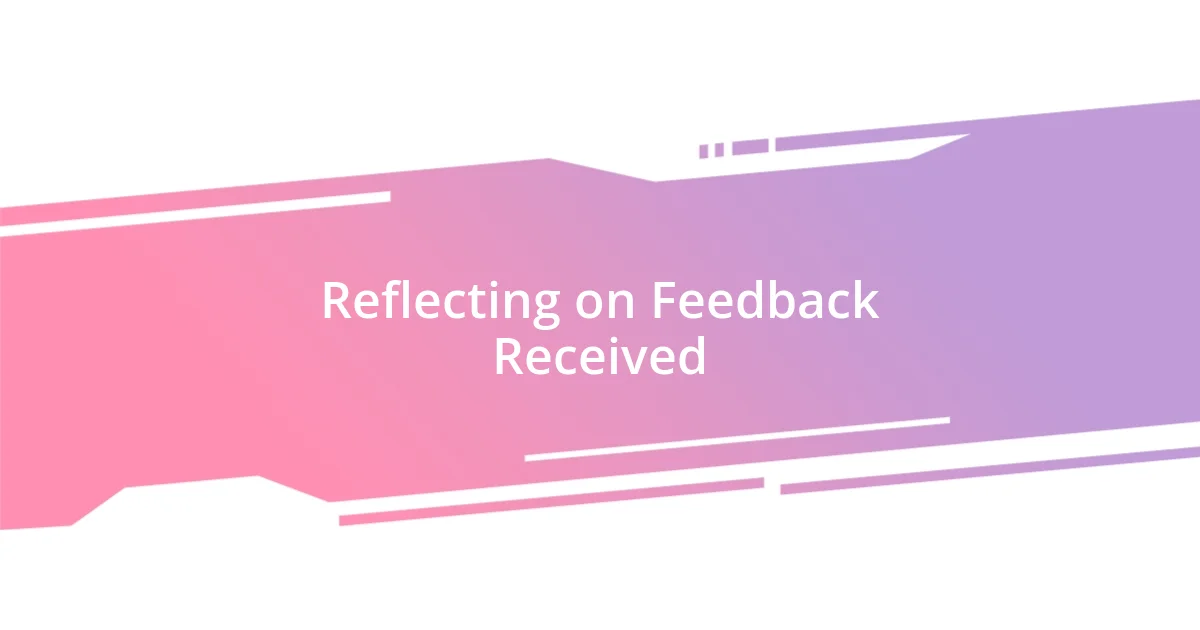
Reflecting on Feedback Received
Reflecting on the feedback I receive is a crucial step in my writing process. I remember a time when a beta reader pointed out some inconsistencies in my plot. At first, I felt defensive, but after taking a step back, I realized how much her perspective enriched my understanding of the story. This shift reminded me that feedback is less about personal judgment and more about offering fresh viewpoints that can elevate my work.
When I delve into feedback, I often take notes highlighting key points and my initial reactions. This practice helps me track my emotions and thought processes over time. I can still recall a moment when I was blindsided by a harsh critique of my dialogue. Instead of dismissing it, I sat down with a glass of water, reflecting on why it struck a chord with me. Did it resonate because it was true? That realization became a pivotal moment that led me to experiment with my character’s voice, ultimately enhancing their authenticity.
I find it vital to revisit feedback after some time has passed; a week or so later, I approach the comments with fresh eyes. I can’t tell you how transformative this practice has been. Sometimes, it’s in that quiet moment away from my initial emotional reaction that I uncover the most profound insights. Have you ever sat down to revisit something only to find a wealth of inspiration hidden beneath your initial disappointment? That’s the magic of reflection—every piece of feedback carries the potential to become a stepping stone in my writing journey.
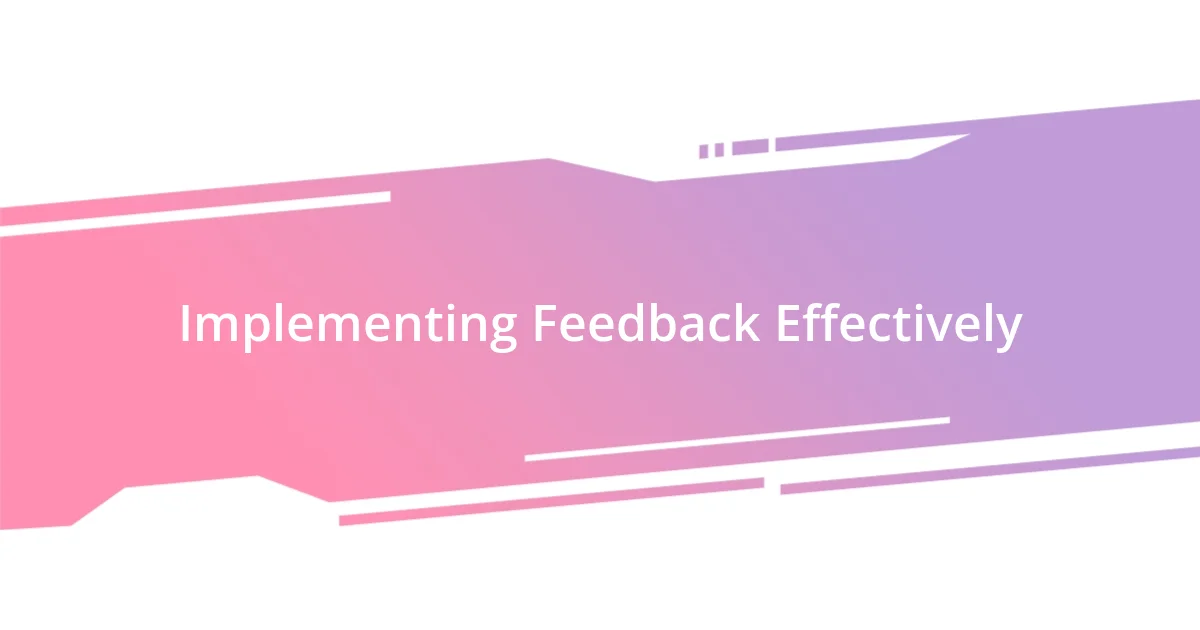
Implementing Feedback Effectively
Implementing feedback effectively has taught me to embrace the art of discernment. I remember receiving a flurry of comments on a poem I had poured my heart into; some felt off-base, while others found their mark. I learned to categorize the feedback—separating what resonated with my vision from suggestions that didn’t align with my artistic intent. Have you ever faced feedback that felt conflicting? That’s when I learned to trust my instincts while remaining open to perspectives that might stretch my understanding.
Once I sift through the comments, I take actionable steps to revise my work. It’s not just a matter of checking boxes; it’s about transforming insights into tangible improvements. For example, after noting that a reader found my protagonist unrelatable, I decided to rewrite several key scenes to deepen her emotional journey. Each revision became an opportunity for growth. Have you experienced the thrill of seeing your work evolve? I find that each change can rejuvenate my excitement for the piece, turning the editing process into a creative adventure.
Moreover, I find it helpful to revisit my original goals and reflect on how feedback aligns with them. Have you encountered moments when feedback seemed to lead you off course? Rather than feeling deflated, I remind myself of my writing’s purpose. Recently, a mentor’s suggestion pushed me to introduce a secondary character to enhance the narrative. While initially hesitant, it unfolded beautifully and ultimately enriched the story’s depth. This interplay between feedback and intention transforms not just the piece but also my growth as a writer.

Continuing to Grow from Feedback
Continuing to seek growth from feedback is a journey I cherish. There was a time when a mentor suggested a complete rework of my story’s ending. I can still feel that initial pang of fear—would I lose everything I loved about it? But taking that leap not only salvaged the essence of my story but also paved the way for a more impactful conclusion. Have you ever made a change that scared you, only to realize it was exactly what your piece needed?
Once I’ve integrated feedback, I often share my revised work with trusted peers. Their reactions provide a new layer of insight. I remember sending out an updated chapter, and one reader’s enthusiasm brightened my day. Hearing someone say, “This part really hit me emotionally!” fueled my passion and reminded me that the revisions were worthwhile. It’s fascinating how feedback can transform not just the text but my entire outlook on the writing process. Have you found that feedback can sometimes reignite your passion for a project?
As I continue to grow, I make it a point to document my feedback-related experiences. Reflecting on how I felt after receiving different comments creates a sort of roadmap for future revisions. For instance, I once kept a journal dedicated to feedback, recording my emotional responses alongside the critiques. This practice became invaluable. It not only highlighted recurring themes in the feedback I received but also showcased my evolution as a writer. Have you thought about tracking your feedback journey? It’s a revealing experience, illuminating how far I’ve come and how much further I can go.












